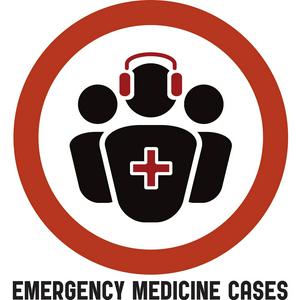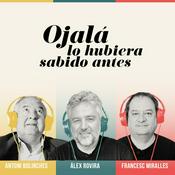387 episodios

EM Quick Hits 70 MedMal Cases Upper Back Pain, Traumatic Pneumothorax/Hemothorax Decision Making, Risk Stratification of ICH for Consultation, Post-Circumcision Bleeds, IV Contrast Allergy, Emotional Contagion
13/1/2026 | 1 h 6 min
In this month's EM Quick Hits podcast: Mike Weinstock discusses with Anton a case of upper back pain in this month's Medmal Cases, Andrew Petrosoniak on traumatic pneumothorax and hemothorax decision making: risk stratification, imaging cutoffs and chest tube choices, Justin Morgenstern on brain injury guidelines risk stratification for neurosurgical consult, repeat imaging and admission, Andrew Tagg on management of post-circumcision bleeding and when to escalate care, Hans Rosenberg & Ariel Hendin on evaluation and management of CT contrast allergy and why steroids are out, Shawn Seregren on emotional contagion in resuscitation teams: how tone, pace and volume of your voice and body language effect team rescucitation dynamics and outcomes...

Ep 211 Thyrotoxicosis and Thyroid Storm: Recognition and Management
30/12/2025 | 1 h 13 min
In this Part 2 of our 2-part podcast series on thyroid emergencies Anton, Dr. George Willis and Dr. Alyssa Louis answer questions such as: When a patient presents with “sepsis without a source,” what bedside features should trigger you to prioritize thyrotoxicosis? How can PoCUS help you decide whether tachycardia is dangerous — or lifesaving — before starting β-blockade? Why can TSH and free T4 be falsely reassuring in a crashing patient, and what labs actually matter early? In which patients does propranolol increase the risk of cardiovascular collapse — and why is esmolol the safer first line medication? Why does the order β-blocker → thionamide → steroid → iodine matter, and what happens if you get it wrong? When is not giving a β-blocker the safest decision in thyroid storm, even in a profoundly tachycardic patient? In an agitated, hyperthermic patient with thyrotoxicosis, why might intubation be more dangerous than helpful in the first hour? How does amiodarone-induced thyrotoxicosis fundamentally change your management — and why can iodine make it worse? and many more...

Ep 210 Decompensated Hypothyroidism Recognition and Management
16/12/2025 | 1 h 12 min
In the ED, we regularly care for sick patients presenting acutely with abnormal vital signs, altered mental status, and end organ dysfunction. Oftentimes, the culprit ends up being sepsis, or overdose, or organ failure. But it is important that we consider rarer endocrine presentations like decompensated hypothyroidism. In this Part 1 of this two-part podcast with Dr George Willis and Dr Alyssa Louis, we answer questions like: Why is the term myxedema coma a misnomer and should be abandoned? How can we differentiate between sepsis or environmental hypothermia or toxidrome from decompensated hypothyroidism at the bedside? When is it appropriate to order a TSH, a T4 and T3? What are the most important life-threatening triggers that need to be addressed in patients with decompensated hypothyroidism? Why is it important to test for cortisol levels and consider stress-dose steroids in all patients with decompensated hypothyroidism? Why is endotracheal intubation particularly dangerous in decompensated hypothyroidsm? What is the best way to manage hypothermia? Why is the order of medications for treatment of decompensated hypothyroidism so important? and many more... Please consider a donation to EM Cases to ensure continuing Free Open Access Medical Education: https://emergencymedicinecases.com/donation/

EM Quick Hits 69 Pediatric Urinary Retention & Acute Transverse Myelitis, Post-Dural Puncture Headache, Med Mal Cases: Clenched Fist Injury, IV Thrombolysis for Minor Stroke, EM Leadership Spotlight #4
02/12/2025 | 1 h 32 min
On this month's EM Quick Hits podcast: Deborah Schonfeld on the differential diagnosis and work up of pediatric urinary retention & acute transverse myelitis, Jesse McLaren on his Tryptic Approach to Occlusion MI Diagnosis, Matthew McArthur on recognition and management of post-dural puncture headache, Joseph Yasmeh on Med Mal Cases: Clenched fist injury, Brit Long on IV thrombolysis for minor strokes and Victoria Myers & Lauren Westafer on mentorship and what it means to be a physician leader... Please consider a donation to EM Cases to support high quality Free Open Access Medical Education here: https://emergencymedicinecases.com/donation/

Ep 209 Nondisabling Stroke Recognition and Management
11/11/2025 | 1 h 19 min
In this Part 2 or our 2-part podcast update on ED stroke management with Dr. Katie Lin and Dr. Walter Himmel we explore non-disabling strokes, where symptoms are mild enough that patients can continue daily activities if deficits persist. Yet, non-disabling does not mean benign. Non-disabling strokes occupy the same ischemic continuum as TIAs and carry a substantial risk of early recurrence with disabling stroke. In this EM Cases podcast we answer questions such as: Which patients with non-disabling stroke can safely go home with prompt follow-up and which require urgent investigation or admission? Which stroke mimics do we need to be on the look out for and how do we identify them at the bedside? How dangerous is thrombolysis in a patient with presumed stroke who turns out to be a stroke mimic? What are the key distinguishing features between a stroke and functional neurologic disorder? What are the most common causes of stroke in young people that we commonly miss? How does stroke etiology dictate the management pathway? What are the indications for carotid endarterectomy in patients with non-disabling stroke and what is the ideal timing of the endarderectomy? When is dual antiplatelet therapy vs single antiplatelet thereapy vs anticoagulant therapy indicated? What is the best medication strategy for the patient on a DOAC for atrial fibrillation who presents to the ED with a non-disabling stroke? For patients not on a DOAC for atrial fibrillation who come in with a stroke, when is it safe to start anticoagulation? and many more... Make A Donation: https://emergencymedicinecases.com/donation/.com
Más podcasts de Educación
Podcasts a la moda de Educación
Acerca de Emergency Medicine Cases
Escucha Emergency Medicine Cases, ZZEN Talks y muchos más podcasts de todo el mundo con la aplicación de radio.es

Descarga la app gratuita: radio.es
- Añadir radios y podcasts a favoritos
- Transmisión por Wi-Fi y Bluetooth
- Carplay & Android Auto compatible
- Muchas otras funciones de la app
Descarga la app gratuita: radio.es
- Añadir radios y podcasts a favoritos
- Transmisión por Wi-Fi y Bluetooth
- Carplay & Android Auto compatible
- Muchas otras funciones de la app


Emergency Medicine Cases
Descarga la app,
Escucha.







































